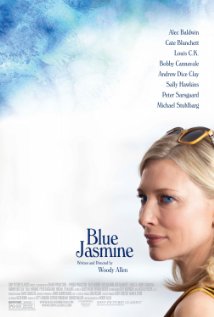
It is odd to say that one of the best things about this movie is the casting. Everyone in the film fits their role perfectly. Even the small roles are perfectly performed--Andrew Dice Clay comes off particularly well in a smaller role. There are too many perfectly cast smaller roles to conveniently list. They just all work. So many movies seem to pick lead actors based on star power and supporting actors out of a hat.
Cate Blanchett stars as Jasmine (or Jeanette), a snobby formerly wealthy sister to Sally Hawkins’ Ginger. The focus of the film is clearly Blanchet and it would be shocking to not see her name on the list of Oscar nominees for best actress. She plays the manic, overbearing but at the same time fragile character with subtlety. Hawkins also turns in a nice performance as Ginger. The “Brando role” here is split into older and younger versions—the older being Clay as Augie and the younger being Bobby Cannavale as Chili, who Boardwalk Empire fans will recall as the kinky, psychotic Gyp Rosetti. Cannavale is the one who manages some of the film’s levity but he also has some standout dramatic scenes. His character is drunk, violent but somehow manages to remain endearing.
This film shows an affection for the average person and disdain for the wealthy—especially the wealthy who prey on others. In the context of the film they are liars, they cheat, they are superficial and they look down on anyone below their strata. But Allen doesn’t make the average people; the regular schmoes seem perfect either. They struggle. They drink. They fight with one another and cause scenes. It wouldn’t be out of line to take issue with the “poor folks are loud and boorish and drink beer” and “rich folks who are snooty and drink wine” black and white world of the film. It is a little stereotypical but it is also hard to deny these particular stereotypes exist. To offer shades of grey, in this case, might over complicate the film, offer unnecessary side-tracks and interpretations.
Which brings us to how well written this is. Keeping the world simple so you can make characters more complicated just works. The characters are believable and while you may not feel any particular liking for any of them, you still want to find out what happens. Jasmine isn’t the only character that isn’t totally sympathetic. Chili is a boor with a violent temper who drinks too much. Ginger is looking for love and is ready to run out on her man when what she thinks is better option is available. All of Jasmine’s society friends are phonies. Obviously Jasmine’s husband, Hal (played by Alec Baldwin) isn’t sympathetic as a crook and philanderer. Nonetheless you stay interested in the film and the characters. This is no mean feat when none of the characters make you like them.
This is an interesting movie in itself and also in the context of film history; where is it in the list of the best of Woody Allen and how does it compare to the inspiration, Streetcar Named Desire? More than this the film is just entertaining and it works on a number of levels with every detail thought out, from minor characters to location. Woody Allen has not lost a thing as a director or writer.


 RSS Feed
RSS Feed